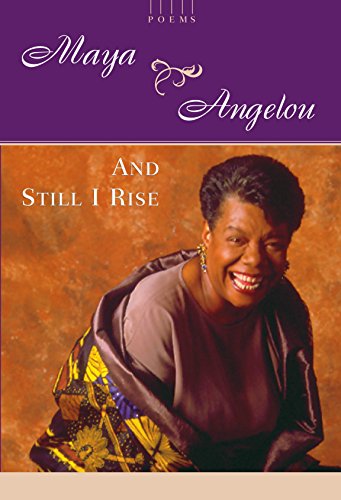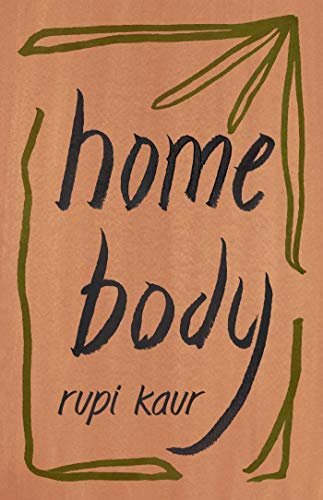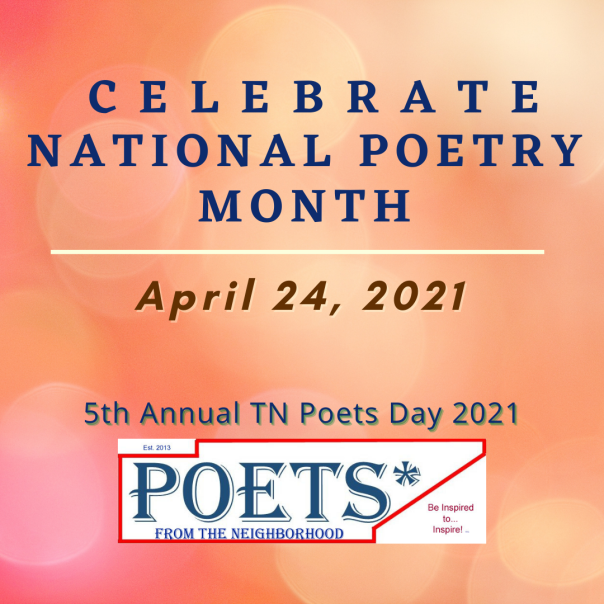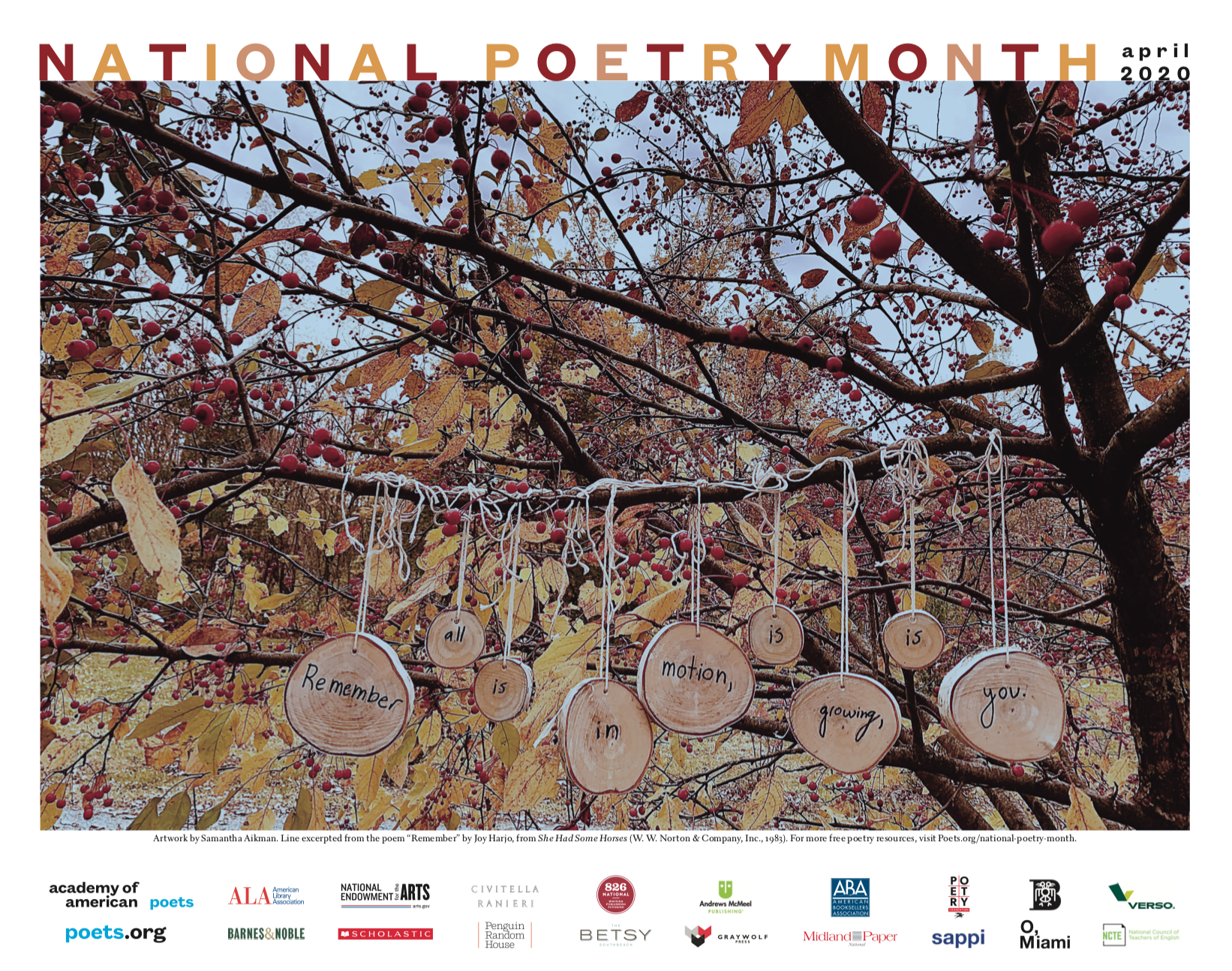Blog Archives
5th Annual TN Poets Day 2021
Virtually Celebrating National Poetry Month at the 5th Annual TN Poets Day on Saturday, April 24, 2021
EVENTS Include:
- Opening Speech by Williamson County Mayor Rogers Anderson
- Welcome & PFTN Awards Presentation by Founder /Organizer- Veera Dr. Rajaratnam S.
- Poets From The Neighborhood (PFTN) Monthly Featured Poets
- TN POETs Open Mic Poetry Readings
- Singer/Songwriter Kathryn Adams’ Songs Performance
- An Interview of ‘JOYPOET’ VeerajaR on PFTN’s Community Outreach Efforts & Poetry Events – by WCPL Director Dolores Greenwald
- TN POET Jeff Hardin’s Craft Talk****
- All EVENTs are RECORDED and Aired on WC-TV, TN /April 24th & LiveStream online via YouTube!
- Starts @ 9:00 AM CDT
Please check WC-TV, TN Link on April 24th:
https://tn-williamsoncounty4.civicplus.com/629/On-Demand
The Space for True Reception: Why We Love Great Verse
By Allan Cross, Reference Department
Poetry isn’t the simplest thing to appreciate. At a passing glance, it may not have the same immediacy of film, music, and visual art. When placed alongside other forms of literature, a book of poems can struggle to match our latest bestsellers in accessibility. For all these reasons, some of us might dismiss poetry as a medium for high-minded wordsmiths, rather than a readership of less heady taste. But exceptional poetry has endured for millennia, and verse as a creative avenue stretches onward still. Why, then, do so many others read and derive worth from it today?
The convenient answer nowadays might be to quote Dead Poets Society. Mr. Keating, an English teacher played by the late Robin Williams, inspires his students (and unceasing scores of audiences) with his speech about why people read and write poetry. One of the film’s great strengths lies, of course, in its poetry readings. These, combined with well-chosen samples, bring forth the emotional meaning that fuels successful verse. The film serves as a great access point to poetry, emphasizing the importance of reading it aloud. When we readers encounter a given poem, we can better involve ourselves by audibly speaking the work. By doing so, we should enhance the piece with our individual voices, each one conducive in its own distinct way.
Testing this in light of three widely known poems seems a good place to begin. The trio we have selected consists of Robert Frost’s “The Road Not Taken,” Rudyard Kipling’s “If–,” and Shel Silverstein’s verse children’s book The Giving Tree.
 In the third stanza of “The Road Not Taken,” Frost writes:
In the third stanza of “The Road Not Taken,” Frost writes:
And both that morning equally lay/
In leaves no step had trodden black./
Oh, I kept the first for another day!/
Yet knowing how way leads on to way,/
I doubted if I should ever come back.
Andrew Spacey, a commentator for Owlcation, points out that Frost’s work reflects on the many choices we make in life, and how we tend to regret those decisions after committing to them. It is also commonly read as a statement in support of individualism, and the promotion of opinions that contrast with majority views.
 Below is an excerpt from Kipling’s “If—”:
Below is an excerpt from Kipling’s “If—”:
If you can dream—and not make dreams your master;/
If you can think—and not make thoughts your aim;/
If you can meet with Triumph and Disaster/
And treat those two imposters just the same;/
If you can bear to hear the truth you’ve spoken/
Twisted by knaves to make a trap for fools/
Or watch the things you gave your life to, broken,/
And stoop and build them up with worn out tools:
The theme of Kipling’s work, which regards the importance of thought, but not to the point where it impedes action, seems like a stirring antidote to Frost. It acknowledges the significance and moral need for regret, but urges the reader not to allow past mistakes to obstruct the path to future growth.
 The Giving Tree addresses similar concerns, as shown in some of its final lines:
The Giving Tree addresses similar concerns, as shown in some of its final lines:
“I am sorry,” sighed the tree./
I wish that I could give you something…/
But I have nothing left./
I am just an old stump./
I am sorry….”/
I don’t need very much now,” said the boy./
“just a quiet place to sit and rest.”/
I am very tired.”
Rivka Galchen, in her 2014 review for The New York Times, argues that there is an unavoidable dilemma in The Giving Tree, it being whether we read it as a statement on thoughtless acquisition or unreserved giving. The two characters, the boy and the tree, do what is most fundamental to their natures. It’s up to the reader to then decide how to feel about the situation, including the conclusion about whether it turns out morally right.
The takeaway from all of this, in spite of all the people who attempt to influence our points-of-view, is that we allow ourselves to read and study works on our unique terms. As mentioned earlier, it may prove worthwhile to read these pieces and others to ourselves (at the risk of seeming foolish), in order to bring out their inherent humanity. We should remember that reading can be, in its way, a roomy type of interpretation. There’s a mysterious element of poetry, one we cannot entirely rationalize and so must trail behind. Rather than strain for full understanding, this is the process we might instead come to accept.
Sources:
- https://allpoetry.com/poem/8538991-The-Giving-Tree-by-Shel-Silverstein
- https://www.poetryfoundation.org/poems/46473/if—
- https://www.poetryfoundation.org/poems/44272/the-road-not-taken
- https://interestingliterature.com/2017/04/20/a-short-analysis-of-rudyard-kiplings-if/
- https://owlcation.com/humanities/Analysis-of-Poem-The-Road-Not-Taken-by-Robert-Frost
- https://www.nytimes.com/2014/10/05/books/review/the-giving-tree-tender-story-of-unconditional-love-or-disturbing-tale-of-selfishness.html
- Weir, Peter, director. Dead Poets Society. Touchstone Home Entertainment, 1989.
- Wikimedia Commons
Poetica
By Howard Shirley, Teen Department
Poetica

Howard Shirley
It’s April.
It’s National Poetry Month.
1996.
There. You have a year.
That’s when it started.
The American Academy of Poets.
That’s who started it.
Not much else factual to say.
But poems aren’t about facts.
Poems are about themselves.
They say whatever they say.
You hear whatever you hear.
That’s a poem.
They’re not about rhyme (though they can be)
They’re not about time (though they can be)
They’re not about meter (rigid or free)
Or fanciful words like “lugubrious.”
Which no one uses any other day.
Or any other way.
Poems are just whatever you want to say.
The way you want to say it.
Your poem is yours.
It can be no one else’s.
It’s National Poetry Month.
So go write a poem.
I just did.
— Howard Shirley
Now it’s your turn! If you are a teenage resident of Williamson County, age 12-18, you are invited to submit your own poems to our Teen Poetry Contest. You may submit up to three poems. Poems are welcome in any form on any subject—the choice is yours (as it should be). A poem may be any length and any style—haiku, sonnet, ballad, limerick, free verse; however your muse takes you. All poems must be your original creations.
All poems must be typed on plain white paper in an ordinary font. Poems with multiple pages should be stapled together. All poems must include the poet’s name, age, school and grade, and contact information (e-mail or phone) at the top of the first page.
We are accepting poems through April 30. You may turn your poem in at any Williamson County Public Library branch, or upstairs in the Teen Room of the Main Branch in Franklin. Contest winners will be announced in May during our Teen Poetry Slam as part of our Summer Reading Kick-off event.

You’ve All Heard of Limericks, I’m Sure
By Lon Maxwell, Reference Department
You’ve all heard of Limericks, I’m sure
Whether racy or actually pure
They’re funny old rhymes
From good old times
And the good ones are rarely demure
They all start in jolly old Britain
Whose poems were occasionally written
In lyrical styles
To bring forth some smiles
And the poets were instantly smitten

City of Limerick, Ireland
The name, it comes from good green Erin
The Maigue Poets used to declare in
the city, Limerick.
Those bards got a kick
from the poetry style used there in.
The transition to bawdier verse
(Or something ocassionally worse).
The decade was roaring
and not a bit boring,
still, reactions were quite terse.
There once was a man, name of Lear
Who wrote them, though not very clear
His meanings were nonsense
With ridiculous contents
And his fame stretches from then to here
Some people delight to change form
From the meter and scheme as a norm
They sometimes depart
On whole, a la cart
But can do so in in whatever manner they choose and still leave it mildly humorous
So let us praise the limerick this way
On this, the Limerick’s Day
They bring joy and delight
And the length is just right
Except like now when I’m carried away!
As one last PS I must add
A very hard time I have had
To not use Nantucket
Or mention a bucket
But I know that would really be bad.















